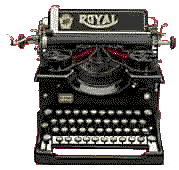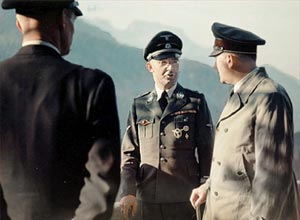| |||
PRESENTED BY THE CONFORMIST HISTORIANS |
Michael V has questions about two volumes of depictions of Hitler's table talk, Saturday, June 21, 2003

Hitler's Table Talk: a dependable source?
IS the book commonly know in the English-speaking world as the Hitler's Table Talk an English translation of François Genoud's French text? And how reliable is it?
![]()
 Index to
Francois Genoud
Index to
Francois Genoud Items on Henry Picker and Table Talk
Items on Henry Picker and Table Talk Francois
Genoud's role in the composition of the fake 1945
Bunkergespräche (Table Talk,"testament")
Francois
Genoud's role in the composition of the fake 1945
Bunkergespräche (Table Talk,"testament")
Bookmark the download page to find the latest new free books |

David Irving replies:
HITLER'S Table Talk comes from the original Bormann Vermerke which the late François Genoud purchased from Bormann's widow Gerda Bormann. They were actually typed from notes taken by the stenographer Heinrich Heim, whom I interviewed and who confirmed the procedure in detail. Each day's entry was initialled by Bormann at the end. They are genuine, in the first person, and highly reliable.
2. Henry Picker took over as Bormann's secretary/adjutant from Heim. He found a lot of Heim's notes in his desk and rewrote them in reported speech and published them and his own notes as Hitlers Tischgespräche. Good, but less reliable.
3. After the war, Genoud obtained
by a very complex process notes on the final
Bunkergespräche of Hitler. Walter Funk was
involved. When I visited Geneva in about 1968 (Elke
Fröhlich, the Goebbels expert, was with me) Genoud
showed us a sheaf of US legal-size paper, closely typed in
German. Nobody has ever seen that sheaf since.  Hugh
Trevor-Roper had published them in English in the late
1950s as Hitler's Last Testament. In interviews with
me, Hitler's adjutants, especially Karl-Jesko von
Puttkamer (on left of picture) disputed their
authenticity. Eventually Genoud, meeting me in Paris, came
clean and told me he had either written, or enlarged on, the
originals himself, in his own handwriting -- in French. On
two different occasions he said to me, apologetically, "That
is surely what Hitler would have said."
Hugh
Trevor-Roper had published them in English in the late
1950s as Hitler's Last Testament. In interviews with
me, Hitler's adjutants, especially Karl-Jesko von
Puttkamer (on left of picture) disputed their
authenticity. Eventually Genoud, meeting me in Paris, came
clean and told me he had either written, or enlarged on, the
originals himself, in his own handwriting -- in French. On
two different occasions he said to me, apologetically, "That
is surely what Hitler would have said."
This explains a number of anachronisms in the text of this latter volume. It also explains why Genoud originally insisted that Hoffmann & Campe, who in the 1970s had a contract to publish the Trevor-Roper edition in German, must work from the French text(!); I told them I had seen a German text in Genoud's hands when I visited him in Geneva. That firm then abandoned the project, and the book was published by Albrecht Knaus of Bertelsmann Verlag.
4. One day I bumped into Genoud in Paris, or we met by arrangement, I can't recall, and he gave me a complete photocopy of the Bunker conversations (1945) in German; they are heavily expanded between the lines in handwriting -- his handwriting, and I suspect his typewriter. Useless as a historical source. I donated them to the Institut für Zeitgeschichte.
5. One final detail: the English translation of the original Hitler's Table Talk was published in about 1949 by George Weidenfeld, who paid a huge sum for the rights -- half to Genoud, and half at Genoud's insistence to Paula Hitler. The Weidenfeld translation is idiomatic and excellent. I read the book as a boy, enthralled. I used the text on several occasions in my book Hitler's War: for that I was denounced as a "falsifier of history", as I preferred the idiomatic Weidenfeld translation to a wooden, turgid, and sludge-like Richard Evans translation as offered to the High Court during the Lipstadt Trial. Remember that whenever you see newspapers refer to me as having been exposed as a "falsifier" of documents.